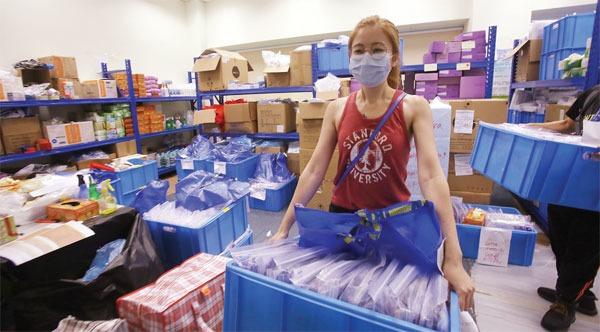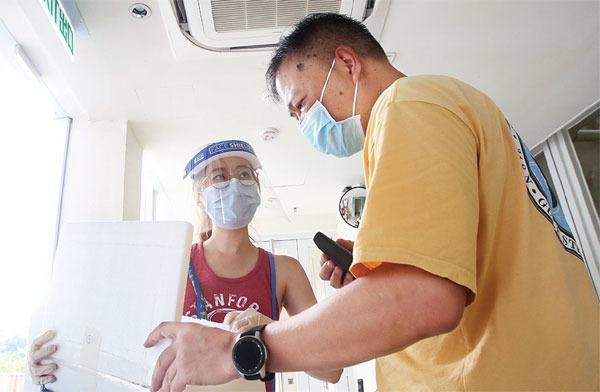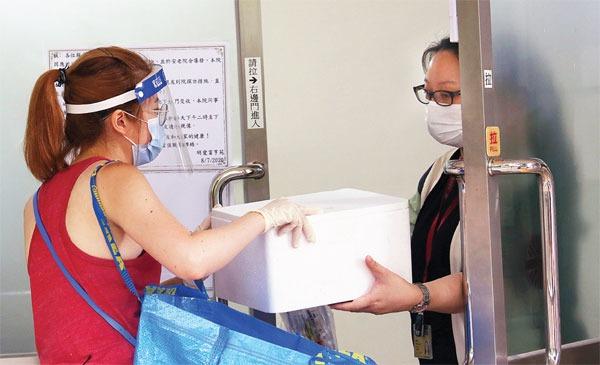People were advised to stay at home when Typhoon Higos brought heavy rains to Hong Kong on Tuesday. But Irene Chik Wing-shan braved the downpour, carrying two loaded Ikea bags without an umbrella, to deliver a special package to people in need.
The young woman, clad in a face shield and a mask, and with sunburnt skin along the edges of her red tank top, trekked along the city's mountainous roads with her ponytail swinging in the rain. She snaked through the lanes of Tai Po, New Territories to deliver bottles for nucleic acid tests for COVID-19 to care homes.
Before the pandemic, what we used to do in the lab was super routine, everything was foreseeable. When it happened, (it was like) we were being thrown into the fields to run in a race against time.
Irene Chik, lab technician, Sun Diagnostic Centre
"We have to keep going, people are waiting for us," Chik said, as she swayed in a van before splashing through rain-soaked streets toward her next destinations. She needed to finish 18 deliveries before noon to be in time for her afternoon schedule and collect samples from 18 care homes in To Kwa Wan in central Kowloon.
Chik, with her top soaked from a mixture of sweat and rain, walked the elderly residents and staffers through the process of sample collection, over and over, in a gentle but upbeat manner.
Chik is a lab technician at Sunrise Diagnostic Centre, a joint venture of genomics technology firm BGI Genomics in Hong Kong. She is among 10 technicians from the company who have been distributing and collecting bottles for COVID-19 tests for care homes, which accommodate the most vulnerable group in society.
Every morning at 7 am since mid-July, she and nine other colleagues arrive at the office and begin the day loading around 8,000 test kits into 10 vans. They deliver the kits to more than 200 care homes in Hong Kong, like a girl scouts' cookie sale. By 7 pm, they have returned with another 8,000 kits containing samples from the kits handed out the day before. Colleagues test the samples in search of those with asymptomatic infections.
 Lab technician Irene Chik Wing-shan loads boxes of testing kits onto delivery vans on Aug 18, 2020. The kits were destined for about 200 care homes across the city. (PARKER ZHENG / CHINA DAILY)
Lab technician Irene Chik Wing-shan loads boxes of testing kits onto delivery vans on Aug 18, 2020. The kits were destined for about 200 care homes across the city. (PARKER ZHENG / CHINA DAILY)
Mass testing
The team is part of the Hong Kong government's one-off, free testing program for groups considered to be at the highest risk of contracting or spreading the virus. The high-risk group includes staff from care homes. The government completed the first round of testing 32,600 staff members in 1,048 care homes by Aug 18. Only one infection was found.
Sunrise Diagnostic Centre and two other private test providers were invited to assist in large-scale tests. By Aug 8, they had conducted about 137,000 tests, finding 54 new cases.
Chik recalled the care home staff were "super happy and excited" when the test kits arrived. The virus has left many workers feeling anxious, but testing for individuals is very expensive, she added.
A caretaker at a disabled care home told China Daily, "The government's project (of testing care home staff) is really, really good. I am happy these young people have come to help us."
The program now has an even wider reach. Its goal is to provide weekly testing for all those in high-risk groups, and this has kept people like Chik busy ever since.
ALSO READ: HK welcomes virus testing support team from mainland
At the start of the mass testing in July, nurses and researchers were among the professionals sent to care homes to collect throat samples and take them back to the lab for testing. As sampling and testing becomes a repetitive task, people receiving the tests were given kits and taught how to do throat swabs on their own - a new task for researchers like Chik.
Those being tested were also told to keep the samples in Styrofoam boxes given to them so that the samples could still be cool when collected the next day.
Chik's personal life has entered a prolonged period that alternates between physical exhaustion and chronic tension.
"Before the pandemic, what we used to do in the lab was super routine, everything was foreseeable. When it happened, (it was like) we were being thrown into the fields to run in a race against time," she said.
The "most amazing thing" about the race, Chik said, is that every employee has made huge progress in their personal growth.
"We used techniques that had never been used before. We learned how to work with different departments. We have had to arrange schedules for tons of tasks. We have to talk to people - usually, you don't have to talk to many people when you're working in the lab. I don't think there are other opportunities like this," she said.
 Chik hands over a boxful of bottles for collecting samples for virus tests to a staff member at a nursing home in Tai Po on Aug 18, 2020. (PARKER ZHENG / CHINA DAILY)
Chik hands over a boxful of bottles for collecting samples for virus tests to a staff member at a nursing home in Tai Po on Aug 18, 2020. (PARKER ZHENG / CHINA DAILY)
Silver lining
Hong Kong-born Chik left for Canada at the age of 7 and returned in 2013 with a degree in microbiology. She did not expect to find a job at a genetic research institute, a field Hong Kong is not known for. "At that time. I thought I would teach the kids English," she said.
To her surprise, she joined the diagnostic center and was later promoted to lead a team of 13 people. All the team have been helping to distribute and collect test kits since July.
Chik recalled that the first day of deliveries was utter chaos. "A lot of things went wrong. Things were missing. We couldn't find some places and so on," she said.
Before they set off, one of the staff burst into tears, afraid she might catch the virus and infect the rest of her family.
READ MORE: HK sees 27 new virus cases, citywide testing to start Sept 1
However, Chik, as the team leader, comforted her colleague, explaining that they would all be provided with full protective gear, and that there was liquid inside the kits to kill the virus.
"But I also explained to her the real risk, because nothing immunizes a person against this virus now," Chik said.
The most important part of getting things on track is to get "feedback and optimize", she noted. Every day the team makes time to talk about what didn't go well that day, what made it easier, and then make any necessary adjustments.
Even as they become proficient and able to accomplish their tasks smoothly, this time-consuming outdoor labor is filled with challenges.
Hong Kong's summer weather is one of them. Either it's hot and the sun is burning down, or it's raining heavily. During Higos, every time she packed the kits and took them out, then shut the back of the van, the rain cascaded around her like a waterfall.
 Chik drops off a package containing testing kits to a care home in Tai Po on Aug 18, 2020. (PARKER ZHENG / CHINA DAILY)
Chik drops off a package containing testing kits to a care home in Tai Po on Aug 18, 2020. (PARKER ZHENG / CHINA DAILY)
Hong Kong's complex terrain is another complicating factor. Locating the addresses of buildings in this mountainous city is akin to solving a Rubik's cube. Chik sometimes had to climb several floors and walk through shopping malls to find a care home on the list. To make matters worse, often when she returned to where she had been dropped off, the van was on another street - in some spots vehicles were only allowed to drop off passengers, but could not park for long.
The projects also provided a chance over the past month for relatively unsociable lab researchers to reach out to nurses, drivers, care home staff, and government agencies
On Tuesday, when she tried to enter a building containing a nursing home, the residential manager rejected her registration form signed in English and asked her to fill it out in Chinese. This posed a new challenge.
Despite all the hardships - lack of sleep or any personal life, disorientation after wandering through unfamiliar streets, and having to decipher Chinese characters she seldom learned while growing up - Chik responded with, "I've lost weight," a remark as light-hearted as it was serious.
She noted that she had received far more help than she expected from others. She believes that Hong Kong used to be a place where people mind their own business. But residents now appear to be friendly, helpful and appreciative of the work that is being done to help them.
"I think it's very rare to have this kind of connection that we're all battling the same thing together," Chik said.
The projects also provided a chance over the past month for relatively unsociable lab researchers to reach out to nurses, drivers, care home staff, and government agencies.
Chik used to believe that Hong Kong government officials worked only regular office hours. But the officials in charge of the community testing have been working late into the night and at weekends to make arrangements, she said.
"I think that in light of this pandemic, people are working day and night to make things happen," she said.
Yiu, the driver who delivers the kits with Chik, shares her enthusiasm.
Yiu, 32, used to be a builder for interior decorators before becoming a cargo driver a year ago after the protest movement affected his old business.
"When the Sunrise Diagnostic Centre reached out to our company (to transport the kits and samples), everyone jumped at it," Yiu said. To make sure the project went smoothly, his company sent 20 vans on the first day, twice as many as the diagnostic center needed.
"Of course, there were people feeling scared about the samples, since no one knew if one contained the virus. But most of us see this as chance to do something for Hong Kong, for our city," Yiu said.
 Chik carries two bags laden with bottles for COVID-19 tests on her way to nursing homes across the city on Aug 18, 2020. (PARKER ZHENG / CHINA DAILY)
Chik carries two bags laden with bottles for COVID-19 tests on her way to nursing homes across the city on Aug 18, 2020. (PARKER ZHENG / CHINA DAILY)
War of attrition
Chik's parents have been supportive of and encouraged her new type of work, which she says is "their own way of trying to help". But Yiu's parents remain in the dark over the nature of his job.
"I don't want them to worry," he said, asking not to be photographed or referred to by his full name. "But I always assume they already know, because they never ask what I do when I am out 12 hours a day. They just wake me up to take a shower when I fall asleep, exhausted," he added.
Both Chik and Yiu said they would continue to fight against the virus as long as it is needed.
The Hong Kong government announced a voluntary mass testing program for local residents that will launch on Sept 1.
The mass testing could be a bigger challenge, but it is important, Chik said.
"If we manage to get everybody tested, that would be a big step for pandemic control. As I understand it, we can't eliminate the virus anytime soon, but if we can do a routine test for everybody, we can contain it," she said.
READ MORE: Collective effort urged to break COVID-19 chain
Large-scale testing is more of a logistical problem for the city than sampling or testing, Chik said, because now everyone can collect samples on their own if they are provided with the testing kit.
Chik added that the outbreak could be an opportunity for Hong Kong's biotechnology industry.
"Hong Kong already has a lot of biotech companies, but people just don't know about them because it's not a big industry," she said.
"I think what we do now is encouraging a lot of young people to consider joining biotech. I hope they will appreciate it as a thing to do for others, (and) not just (for) doing research," she said.
So, if a young biology or technology graduate returns to Hong Kong, as Chik did seven years ago, he or she may aspire to find a role in an industry that has made a remarkable contribution in the fight against the pandemic in 2020, rather than planning to become an English teacher as Chik once did.


